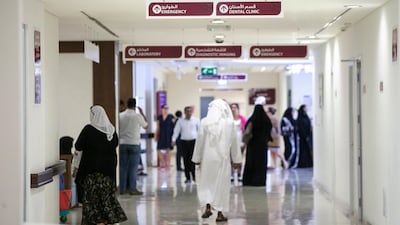The medical records of hundreds of thousands of patients in Abu Dhabi will be connected as public and private hospitals share a database.
The Health Information Exchange System, launched on Wednesday, is the first such database in the region.
Known as Malaffi – Arabic for "my file" – the system will connect more than 2,000 public and private healthcare providers in Abu Dhabi.
It enables doctors to make more informed decisions and increase quality of service while also maintaining confidentiality.
It is also expected to help reduce costs, prescription errors and repeat testing.
Before the launch, doctors relied on patients’ honesty about existing conditions and test results.
“The launch of Malaffi is another addition to the emirate’s healthcare sector, which is witnessing an unprecedented shift towards technology and AI,” said Sheikh Abdulla Al Hamed, chairman of the Department of Health.
“Using these resources the department is transforming health care, increasing positive outcomes and paving the way towards a healthier Abu Dhabi.”
_____________
Read more:
Unified medical record database coming to Abu Dhabi
UAE Cabinet backs national health database initiative
_____________
The system will be operated by Abu Dhabi Health Data Services, a new partnership between the department and Injazat Data Systems, a subsidiary of Mubadala Investment Company.
It will initially connect six of Abu Dhabi’s healthcare providers – Seha, Cleveland Clinic Abu Dhabi, Imperial College Diabetes Centre, Healthpoint, United Eastern Medical Services group and Oasis Hospital, Al Ain.
Under the management of those six organisations are 18 hospitals and 65 medical centres and clinics, with more than 3,500 physicians and 8,300 nurses.
Other healthcare providers are expected to introduce Malaffi by the end of this year.
The system will also allow the government to monitor and manage chronic diseases by identifying their potential spread, which will help in developing emergency medical response plans to prevent epidemics.
“The platform has been developed to scale for the future, with an incredible opportunity to harvest the powers of AI technology and machine learning to improve health outcomes and ultimately prolong life,” said Khaled Al Qubaisi, chairman of Injazat Data Systems.
“Malaffi has been developed to comply with emirate-wide and federal health privacy laws to ensure patient confidentiality and data security.”

